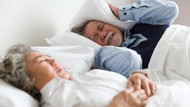If you’re not getting the restful sleep you’ve been used to, it might be because you have sleep apnoea.
Sleep apnoea is where your throat may collapse so much when you’re sleeping that not enough or no air can get into your lungs and you stop breathing during the night when you’re trying to rest 1.
It’s estimated that around 5% of Australians have sleep apnoea, but people aren’t really sure if they have it or if they need to practice better sleep hygiene 1. Here are three signs that you may be experiencing obstructive sleep apnoea symptoms.
1. Poor quality sleep
Getting poor quality sleep impacts everything from your hand-eye coordination to your moods 1. However, when you’re at high risk of sleep apnoea, it may not be obvious that you are getting poor quality sleep as you’re still sleeping through the night.
Other signs that can let you know if you’re getting poor quality sleep include2:
-
Mood changes, including increased irritability
-
Decrease in productivity
-
Making more mistakes at work or at home
2. Daytime sleepiness
Being sleepy during the day is usually a common sign that something is impacting your sleep, especially if you’ve slept through the night before 3.
As you’re not getting the restorative sleep you need to repair your body and influence vital processes and rhythms, people who are suffering from undiagnosed sleep apnoea can have severe daytime sleepiness, drowsiness, fatigue and irritability.
If you find yourself getting really tired or needing to sleep while doing passive activities, such as driving, watching TV or reading, it’s worth investigating whether you are suffering from a sleep disorder or sleep apnoea.
3. Excessive snoring
If your partner or roommate says that you’re a noisy sleeper, it might be worth listening to them as noisy sleeping is one of the warning signs of sleep apnoea.
Jonathan Jun, MD, a pulmonary and sleep medicine specialist at the John Hopkins Sleep Disorder Center, has explained that the scariest part of having sleep apnoea is that you may not even know you’re suffering from it unless your snoring and symptoms are brought to your attention.
“Sleep apnoea may be noticed more by the bed partner than by the sleeper,” says Jun4. “Your bed partner might notice that your breathing pauses, or they may complain of your loud snoring.”
If you’ve read through this article and believe you may be at risk of sleep apnoea, take our free online quiz and book an at-home sleep test to determine your risk factors of sleep apnoea
References
1Better Health Victoria, Sleep Apnoea, accessed 13 March 2023
2John Hopkins Medicine, 4 Signs You Might Have Sleep Apnea, accessed 13 March 2023
3Mayo Clinic, Obstructive Sleep Apnea, accessed 13 March 2023
4John Hopkins Medicine, The Dangers of Uncontrolled Sleep Apnea, accessed 13 March 2023

